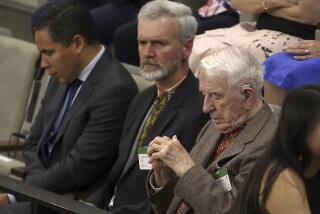Postscript : At Last, a Soviet Hero Gets Respect : Marshal Georgi Zhukov was demoted twice after leading victorious World War II forces. Now he is being honored with a medal, a monument and a museum.
- Share via
MOSCOW — The first public tribute to this country’s greatest World War II hero has been erected in shadows, perhaps fitting for the murky place Marshal Georgi K. Zhukov continues to occupy in Russia’s oft-revised history.
The Red Army’s wartime chief of staff, who led the defense at Stalingrad and personally commanded the final assault on Berlin, died in obscurity in 1974. He had been demoted and banished by Soviet dictator Josef V. Stalin to a command in Odessa after the war, was politically resurrected by Stalin’s successor, Nikita S. Khrushchev, then dumped again.
Piecemeal attempts to rehabilitate Zhukov’s image have been conducted over the last decade, starting with a documentary film on his life released on the advent of the current reform era.
But not until a 20-ton bronze effigy of Zhukov was mounted on a granite pedestal in central Moscow in late April had any Russian leader dared to pay the late marshal public respect in the 50 years since the defeat of Nazi Germany. The statue of Zhukov astride his horse, Kumir, will be dedicated Monday at a ceremony to be attended by President Boris N. Yeltsin.
While the belated act of recognition has pleased war veterans and Zhukov’s family, many wonder why there has yet to be a full or formal rehabilitation of the marshal whose role in the victory--to be marked here May 9--was too important to be denied.
As well as gaining the monument on Manezh Square, near the Kremlin, Zhukov is being honored with a military decoration being issued in his name, the Order of Zhukov, and with a memorial museum in Kaluga, his native city, set to open Friday. Preparations are also being made to celebrate the centennial of his birth next year.
“This is significant recognition of his merits and the family is pleased,” said his daughter, Era G. Zhukova. “But I will consider that he has been completely rehabilitated only when there is a government resolution absolving him of everything of which he was accused.”
After Zhukov returned in 1946 from Germany, where he served in the Allied occupation forces in the vanquished nation, Stalin banished him to Odessa and other obscure regional commands, apparently to eliminate the one figure who could overshadow the supreme leader’s glory.
Zhukov made a political comeback after Stalin’s death in 1953, when he was named first deputy defense minister, and rose to a Cabinet post two years later. But the comeback was short-lived. Khrushchev fired him in 1957, accusing him of “Bonapartism” and disloyalty to the Communist cause and stripping him of all posts and perquisites as a war hero.
Georgy A. Parshin, a senior researcher at the war history department of Moscow’s Military College, says Khrushchev turned on Zhukov for the same reasons Stalin did--out of fear that the popular, respected and strong-willed marshal could pose a challenge to his political power.
The 1985 documentary chronicling Zhukov’s war role finally broke a code of silence that surrounded the late marshal, allowing his name and contributions to enter new history books that proliferated in the age of perestroika. The decision to erect a statue in his honor, however, came only two years ago in the final preparations for marking this month’s anniversary of the Allied victory.
Sculptor Vyacheslav Klykov, who designed the Zhukov memorial, complains that it should have been erected on Red Square, rather than a block away and in the shadows of the imposing brick building that used to house the Lenin Museum.
“Its positioning thoroughly ruins the monument,” Klykov told the newspaper Moskovsky Komsomolets. “Both figures (Zhukov and the horse) will be in the shade of that huge building most of the day.”
Klykov claims that Yeltsin originally agreed to have Zhukov’s statue located on Red Square. But for unexplained reasons, the sculptor says, the location was reconsidered last year.
In addition to catching the shadows cast by surrounding tall buildings, Manezh Square remains the scene of a major subway extension project. Heavy equipment, piles of construction material and huge excavations stand between the newly erected Zhukov statue and the nearest street.
Historian and war veteran Pavel V. Volobuyev shares the Zhukov family’s feeling that the tributes are long overdue but still somehow insufficient to honor his memory.
“I am uneasy with what is being done, for some reason,” said the 72-year-old member of Russia’s prestigious Academy of Sciences. “I can’t help feeling manipulated. There is more political maneuvering here than demonstration of sincere gratitude.”
Volobuyev speculates that the declining popularity of those in power prompted them to “make use of this sacred holiday and legendary military leader to compensate for their own lack of success.”
“The regime is in serious trouble,” the historian said of Yeltsin’s government. “The fighting for the White House (the Russian legislature, in October, 1993) and this shameful war in Chechnya are hardly to their credit. They are desperately grabbing at an honorable man’s memory to score points by proxy.”
In one of the few Russian newspaper accounts of the debate over Zhukov’s return to the ranks of war heroes, Moskovsky Komsomolets also concluded that those now in power have fallen short in showing Zhukov proper respect.
“Just as the authorities failed to appreciate Zhukov in his lifetime, they are equally incapable of immortalizing him now,” the newspaper stated. “Apparently it is the destiny of some great men to remain in shadows even after death.”
More to Read
Sign up for Essential California
The most important California stories and recommendations in your inbox every morning.
You may occasionally receive promotional content from the Los Angeles Times.














